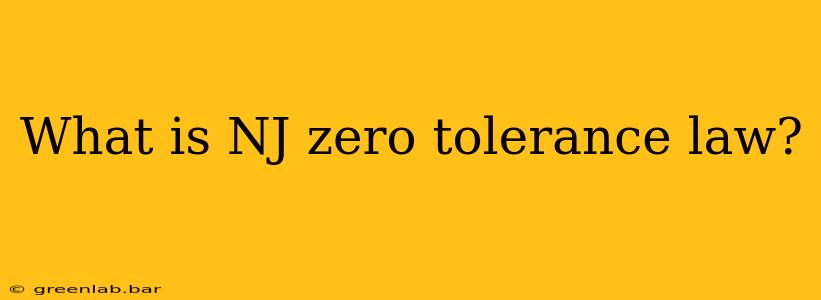New Jersey's zero tolerance law, formally known as the "Driving Under the Influence of Alcohol or Drugs" law, targets underage drinking and driving. It establishes a strict policy with severe consequences for drivers under 21 found with any detectable amount of alcohol in their system while operating a vehicle. This means even a trace amount of alcohol can lead to significant penalties. This guide will break down the specifics of this crucial law.
Key Aspects of NJ's Zero Tolerance Law
- Age Restriction: The law applies to drivers under the age of 21.
- Alcohol Limit: The legal limit is zero. Any detectable amount of alcohol, regardless of how small, constitutes a violation. This is significantly different from the legal limit for adults (0.08% BAC).
- Penalties: The penalties for violating New Jersey's zero tolerance law are substantial and can include:
- License Suspension: A minimum suspension of 30 to 90 days, possibly longer depending on the circumstances.
- Fines: Significant financial penalties.
- Community Service: Requirements for community service hours.
- Ignition Interlock Device (IID): Possible requirement to install an IID on your vehicle, preventing operation if alcohol is detected.
- Driver Improvement Program: Mandatory participation.
- Increased Insurance Premiums: Expect a significant increase in your car insurance rates.
- Criminal Record: Depending on the specifics of the violation, there could be criminal charges which would result in a criminal record.
Beyond Alcohol: Drugs and Zero Tolerance
While most discussions focus on alcohol, New Jersey's zero-tolerance laws also extend to driving under the influence of drugs. Driving while impaired by any substance, legal or illegal, is illegal and will result in severe consequences. Law enforcement uses various methods, including field sobriety tests and blood/urine tests, to detect impairment.
Understanding the Implications
The consequences of a zero-tolerance violation can have long-term repercussions, affecting future employment opportunities, insurance rates, and more. The penalties are designed to be a strong deterrent against underage drinking and driving.
Frequently Asked Questions (FAQs)
Q: What if I'm under 21 and have a prescription medication that impairs my driving?
A: You must inform law enforcement of any prescribed medications that might affect your driving abilities. Always carry your prescription with you. However, even with a prescription, if your driving is impaired, you can still face penalties.
Q: How is alcohol detected?
A: Law enforcement uses breathalyzers or blood tests to detect the presence of alcohol.
Q: What if I refuse a breathalyzer or blood test?
A: Refusal to submit to chemical testing will result in even more severe penalties, including a longer license suspension.
Q: Can I get my license back early?
A: It depends on the specifics of your case. You may be able to petition the court for early restoration, but this is not guaranteed.
Conclusion
New Jersey's zero-tolerance law sends a clear message: underage drinking and driving will not be tolerated. The penalties are severe and designed to deter this dangerous behavior. If you are under 21, it is crucial to avoid alcohol altogether while driving. Understanding this law is vital for ensuring your safety and avoiding potentially devastating consequences. Always make responsible choices and plan ahead for transportation if you will be consuming alcohol. This information is for general knowledge and should not be considered legal advice. Consult with a legal professional for specific legal guidance.

